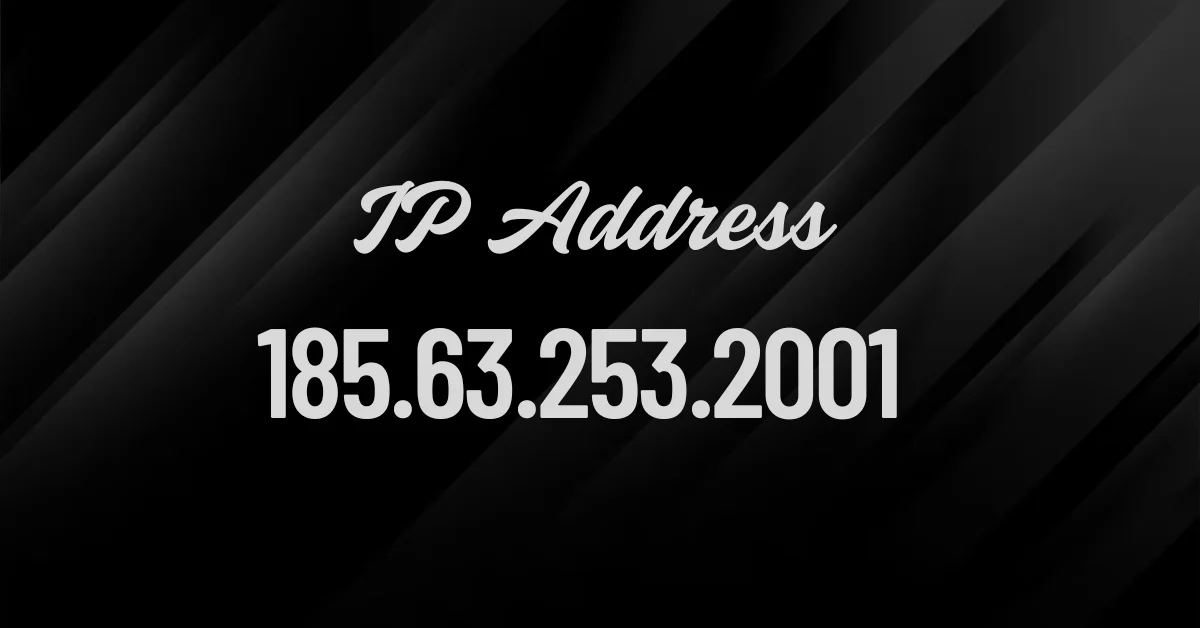Introduction to IP address 185.63.253.2001
IP addresses play a crucial role in how we navigate the internet. They’re like digital fingerprints, uniquely identifying devices connected to networks. Among these unique identifiers lies 185.63.253.2001—an IP address that may seem just another number at first glance but carries its own significance and story.
As we dive deeper into understanding what makes this particular IP address stand out, we’ll explore its format, usage, and potential security implications. Whether you’re tech-savvy or just curious about the mechanics behind online connectivity, there’s something here for everyone to learn about 185.63.253.2001! Let’s unravel the mystery together and shed light on an often-overlooked aspect of our digital lives.
Understanding the format of an IP address
An IP address is a unique identifier for devices on a network. It serves as the digital equivalent of a home address. Understanding its format is essential.
IP addresses come in two main types: IPv4 and IPv6. The most common, IPv4, consists of four sets of numbers separated by periods. Each set ranges from 0 to 255, like this: 192.168.1.1.
IPv6 was introduced to accommodate the growing number of devices online. This version uses eight groups of hexadecimal digits separated by colons, allowing for an almost infinite number of addresses.
Each part has significance too; they can reveal geographical locations and help route traffic efficiently across networks. With every device connected to the internet needing one, understanding how these formats work gives you insight into global connectivity.
The significance of 185.63.253.2001 as an IP address
The IP address 185.63.253.2001 carries specific relevance in the digital landscape. It belongs to a range of addresses assigned primarily for use on the internet.
Understanding its significance requires looking into how it facilitates communication between devices online. Each IP serves as a unique identifier, ensuring that data packets reach their intended destinations without confusion.
Moreover, this particular address is part of the broader IPv4 format, which remains foundational despite an ongoing transition to IPv6 due to increasing demand for connectivity.
For businesses and web services, recognizing such IP numbers can help optimize network performance and enhance security measures against potential threats or misuse.
Ultimately, 185.63.253.2001 reflects the intricate workings of our interconnected world, demonstrating just how vital these numerical identifiers are in maintaining seamless online interactions.
How is 185.63.253.2001 assigned and used?
The IP address 185.63.253.2001, like others, is part of a structured network system. It falls under the IPv4 format but appears uniquely long due to an extra digit.
Typically, this kind of address is assigned by Internet Service Providers (ISPs). They allocate specific ranges of IP addresses to companies and individuals based on their needs.
Once assigned, the IP can be used for various purposes such as web hosting or connecting devices within a local network. Businesses often rely on static IPs for stability and accessibility.
Dynamic allocation may occur as well; here, multiple users share pools of addresses that change over time with each connection session.
Understanding how such an address operates sheds light on digital communication’s backbone while ensuring seamless connectivity in our tech-driven lives.
Potential security risks associated with this IP address
IP addresses can be gateways for various security threats. The address 185.63.253.2001 is no exception.
Cybercriminals often exploit IP addresses to launch attacks like DDoS (Distributed Denial of Service). This could lead to service disruptions, affecting businesses and users alike.
Another risk involves the potential for data breaches. If this IP belongs to a vulnerable server, hackers may gain unauthorized access, compromising sensitive information.
Phishing scams are also prevalent with certain IP addresses. Users might receive emails from seemingly legitimate sources linked to this address, luring them into providing personal data.
It’s essential to monitor network traffic associated with 185.63.253.2001 carefully. Keeping an eye on unusual activity can help mitigate risks before they escalate into serious issues.
Being informed about these potential dangers enables better preparation against threats that could arise from connections tied to this specific address.
Common misconceptions about IP addresses
Many people believe that IP addresses are permanent identifiers for devices. In reality, they can change frequently. This is especially true for dynamic IP addresses assigned by Internet Service Providers (ISPs).
Another misconception is that an IP address reveals a user’s exact location. While it can provide a general area, it doesn’t pinpoint your home or office accurately.
Some also think using a VPN hides all online activities from their ISP. Although a VPN masks the original IP address, ISPs can still monitor data traffic and connection times.
There’s confusion about IPv4 and IPv6 formats. Many users assume all devices use the same format, but transitioning to IPv6 has become essential due to the exhaustion of available IPv4 addresses.
Understanding these misconceptions helps dispel myths surrounding digital privacy and internet connectivity.
Conclusion
Understanding IP addresses is essential in our digital age. Each address serves as a unique identifier for devices connected to the internet, facilitating communication and data exchange. The structure of an IP address includes four sets of numbers separated by dots, offering a systematic way to route traffic.
The specific IP address 185.63.253.2001 holds significance in various contexts, especially concerning its potential assignments and uses within networks worldwide. It’s crucial to understand how such addresses are allocated through registries, determining which organizations or services utilize them.
However, with any technology comes risk. Certain security concerns can arise when dealing with public IPs like 185.63.253.2001, including exposure to cyberattacks or unauthorized access if not properly managed.
Many misconceptions persist about what an IP address can do or reveal about users’ privacy online when it’s often misunderstood as directly linked to personal identities rather than just devices on a network.
As we navigate the complexities of digital interactions and security measures associated with addresses like 185.63.253.2001, staying informed empowers us against potential threats while fostering better understanding of the infrastructure that supports our online activities.
FAQs
Is 185.63.253.2001 a valid IP address?
The format suggests it’s incorrect, as standard IPv4 addresses contain four segments with numbers from 0 to 255.
What does an IP address like 185.63.253.2001 represent?
It represents a network identity for devices, enabling them to communicate, though the number appears to be a formatting error.
Can this IP address be a security concern?
Yes, any IP address—if active—could be a target for cyberattacks if not secured properly.
How are IP addresses like this typically assigned?
They are distributed by Internet Service Providers or official registries, often based on the user’s region or needs.
Does an IP address reveal personal details?
Not exactly. It may point to a general location but doesn’t directly expose personal information.

